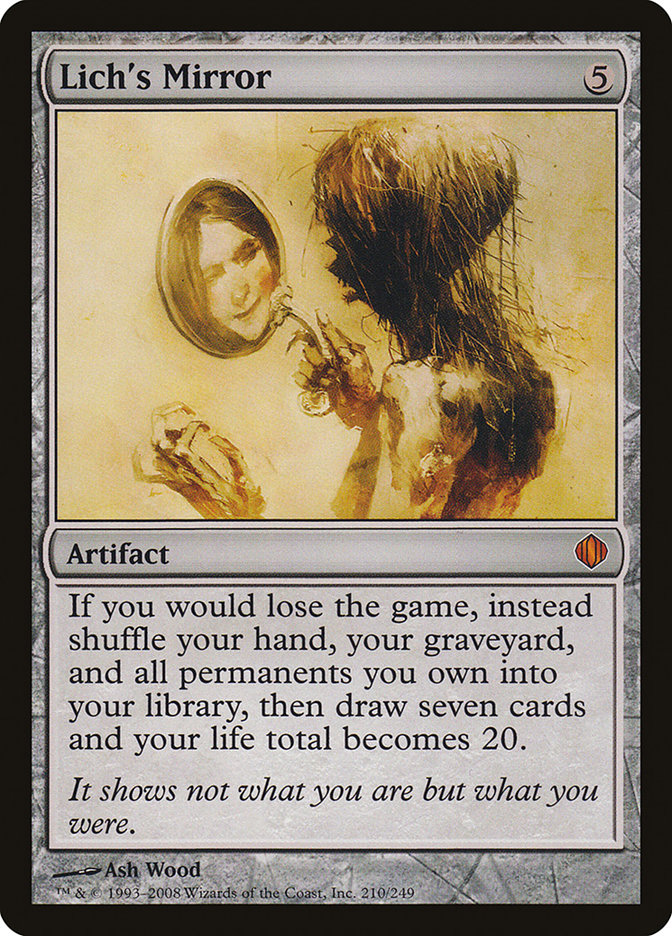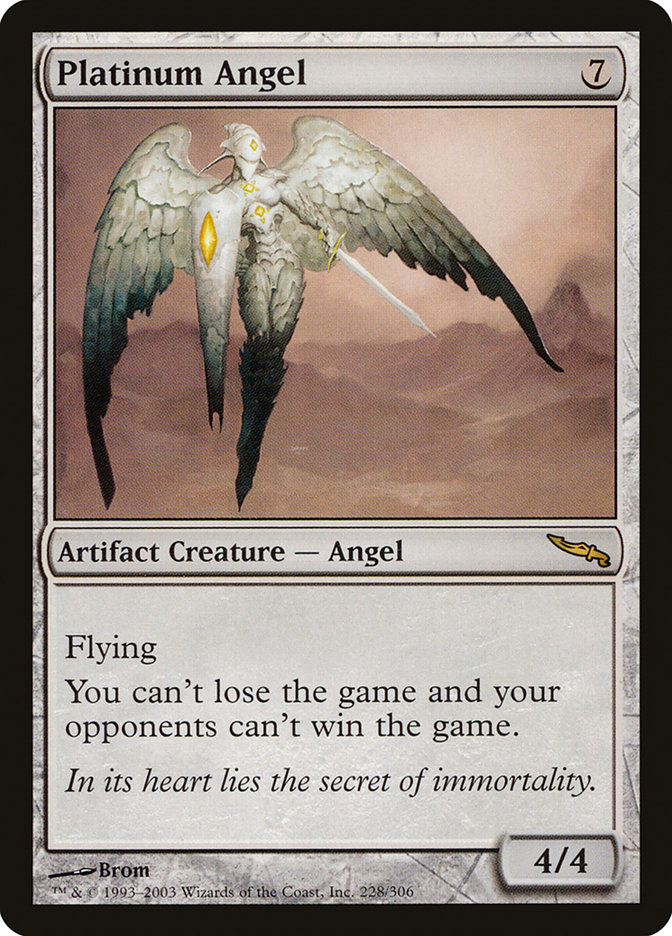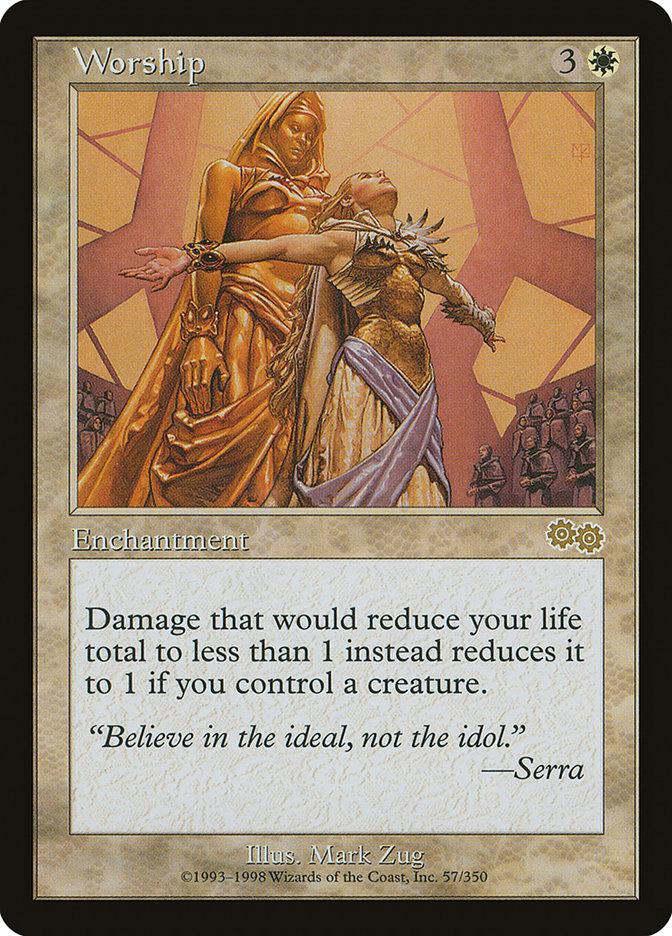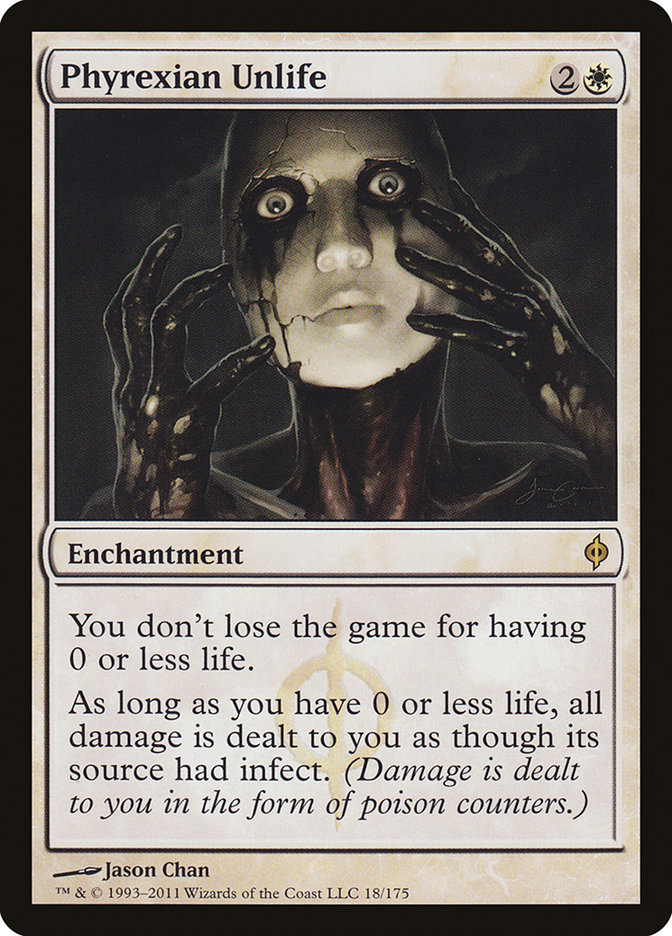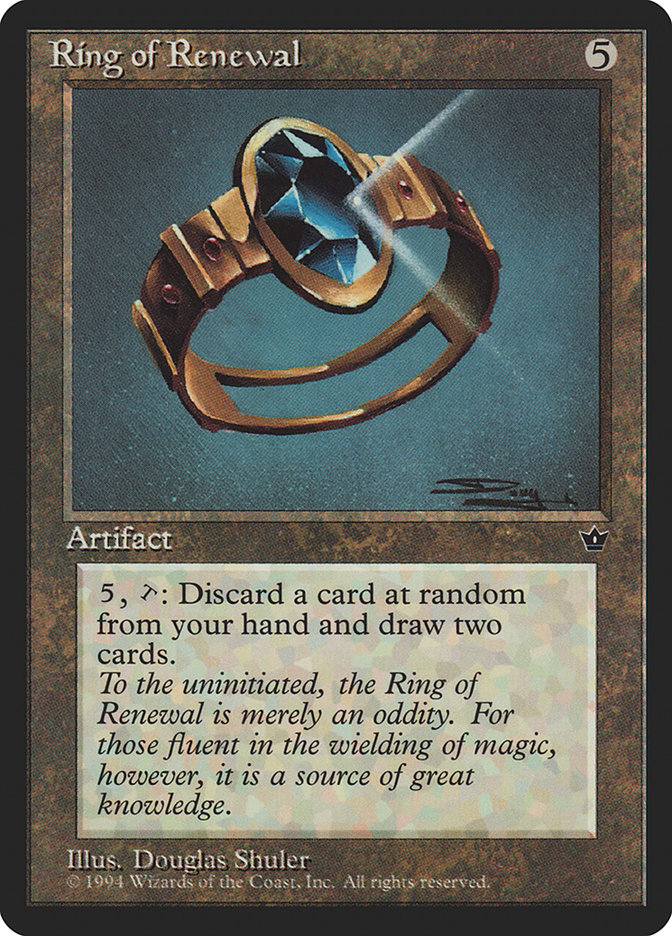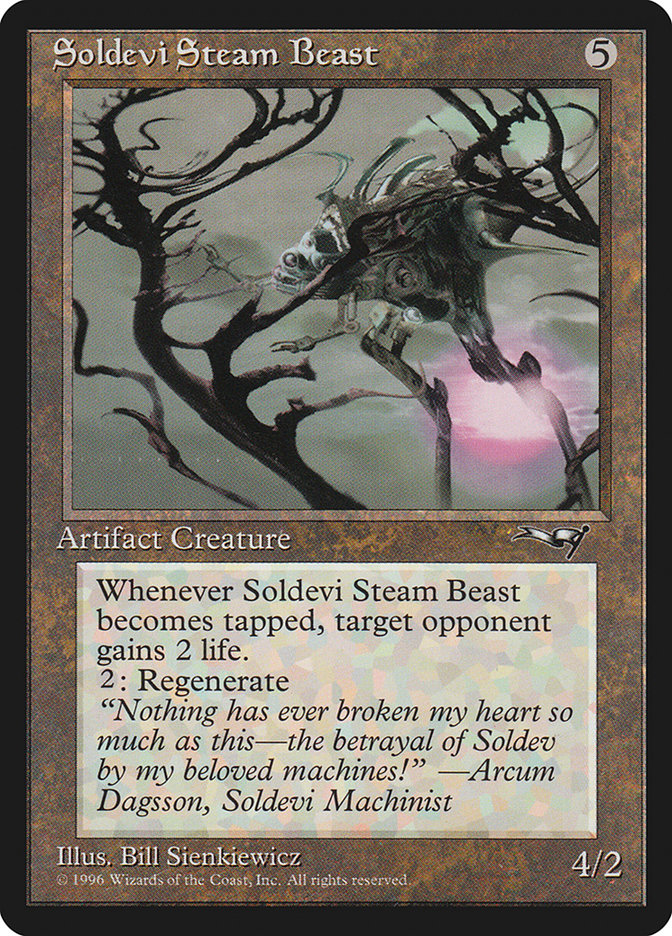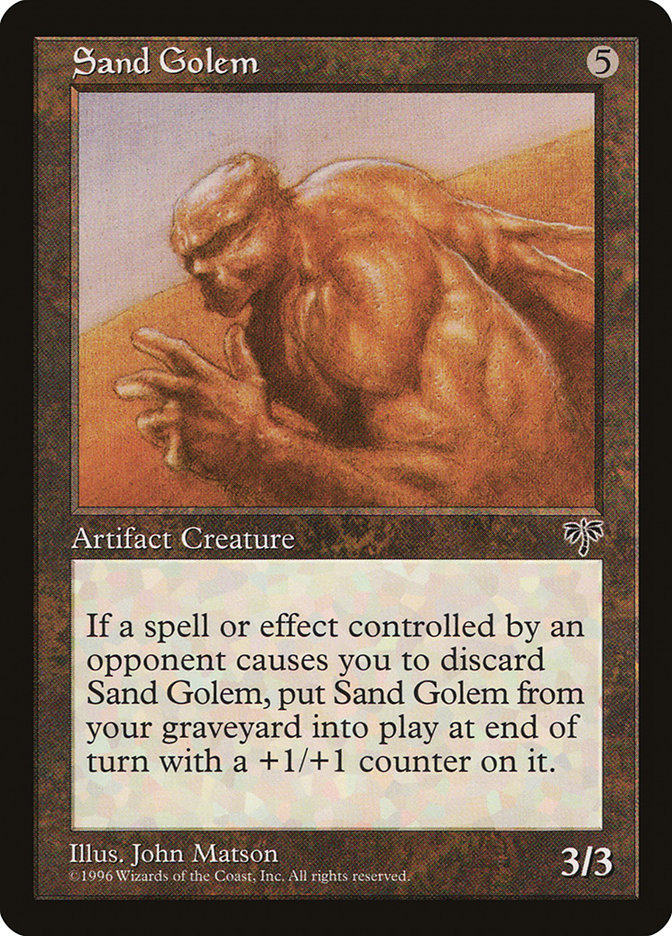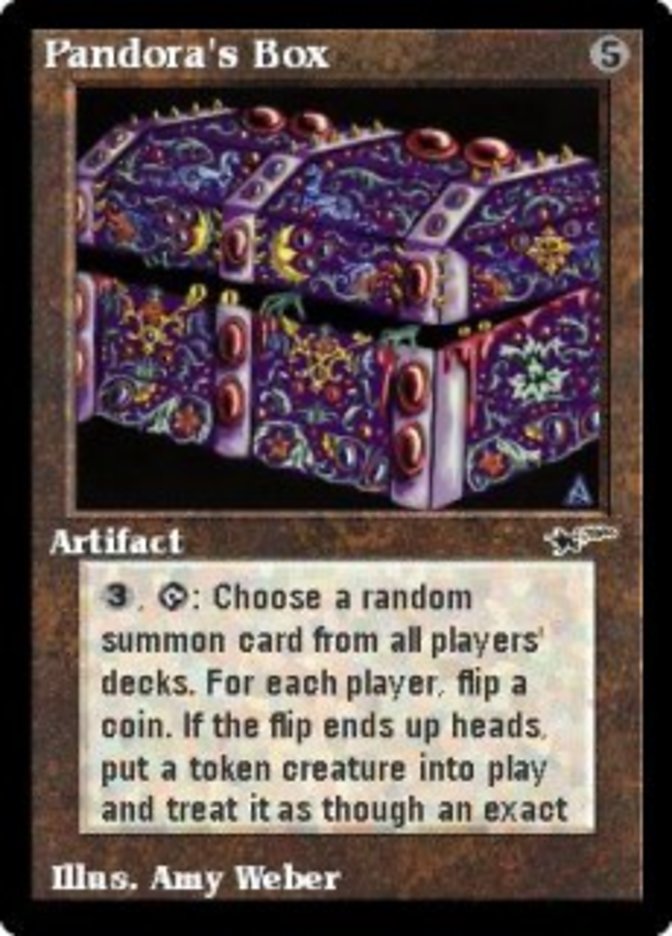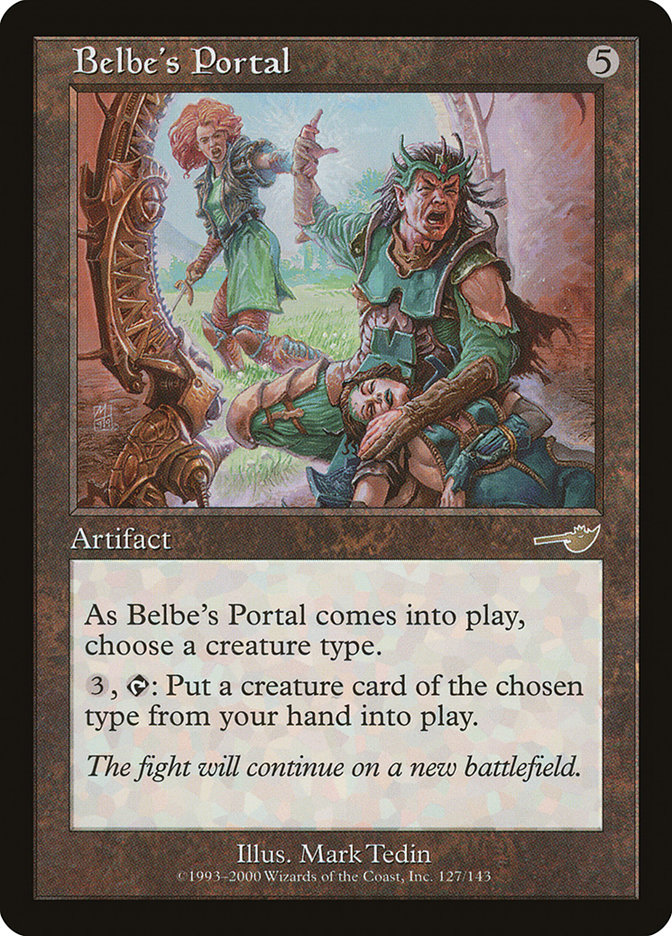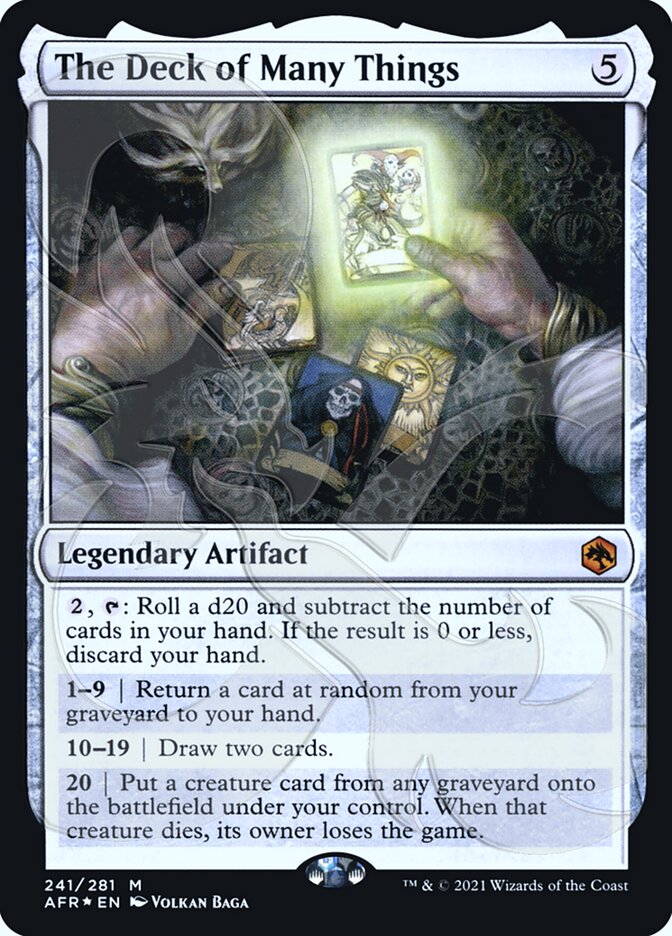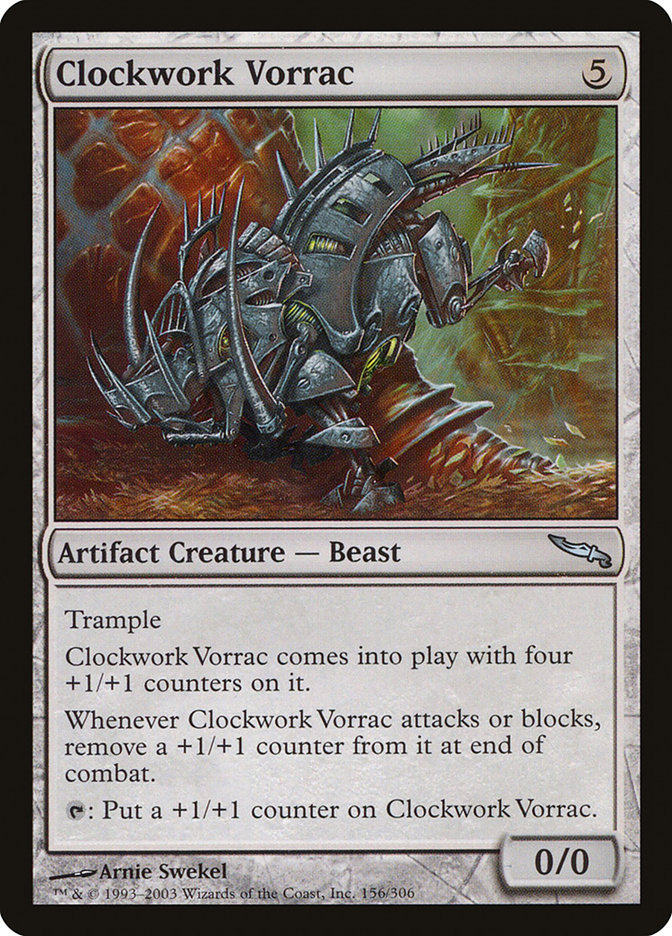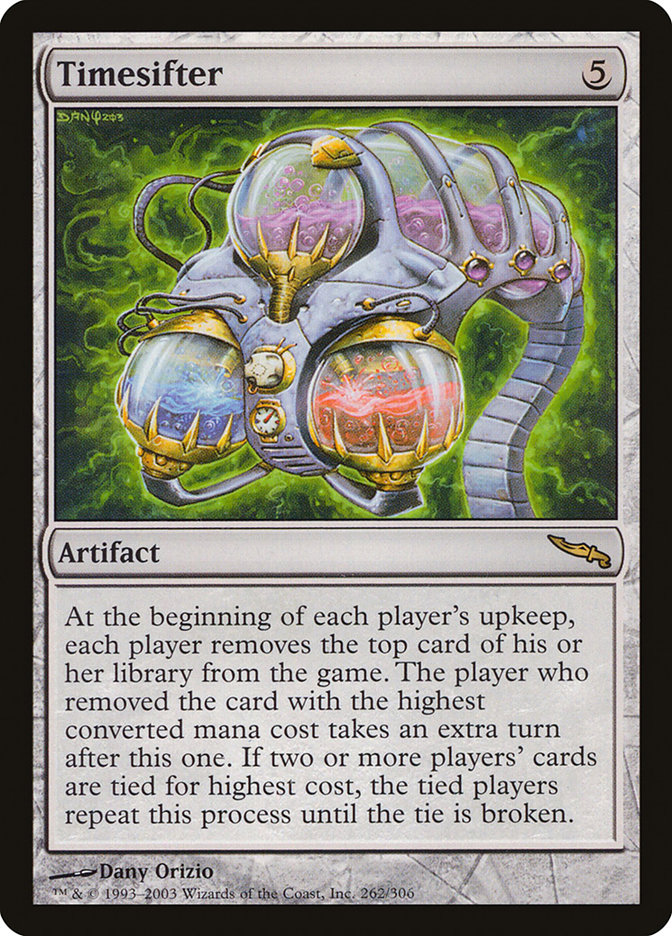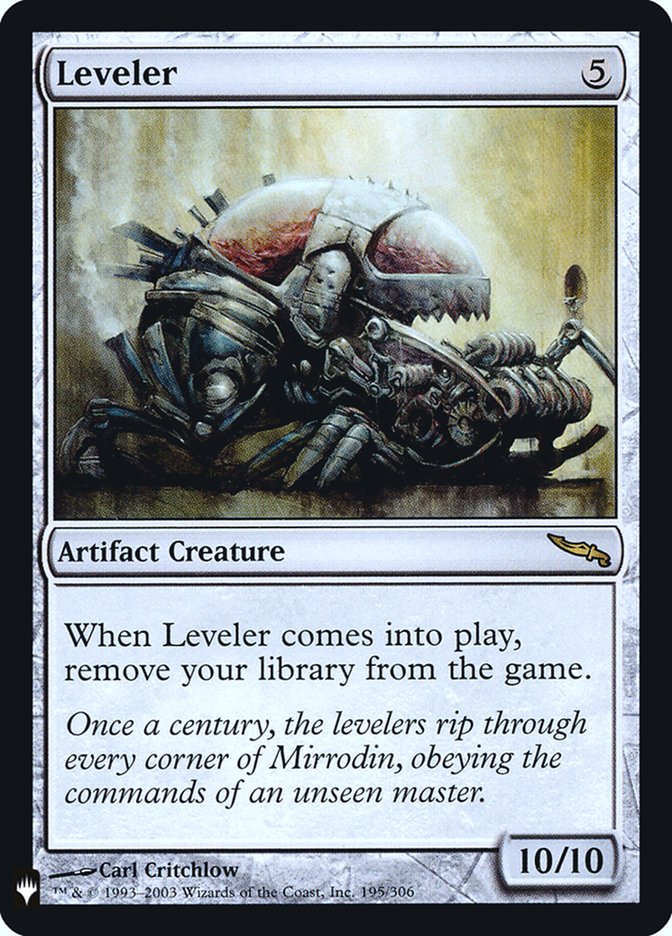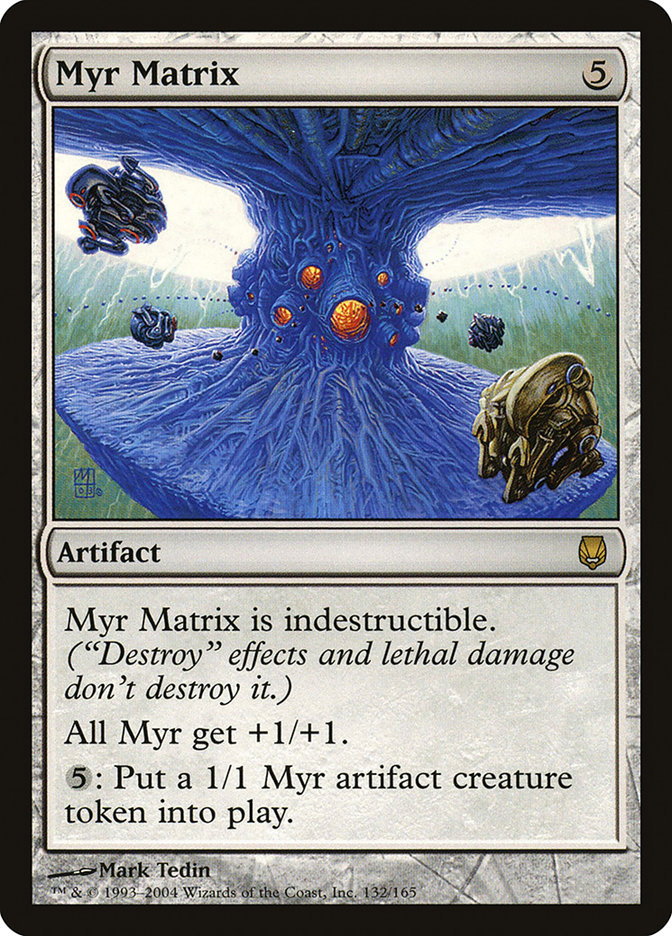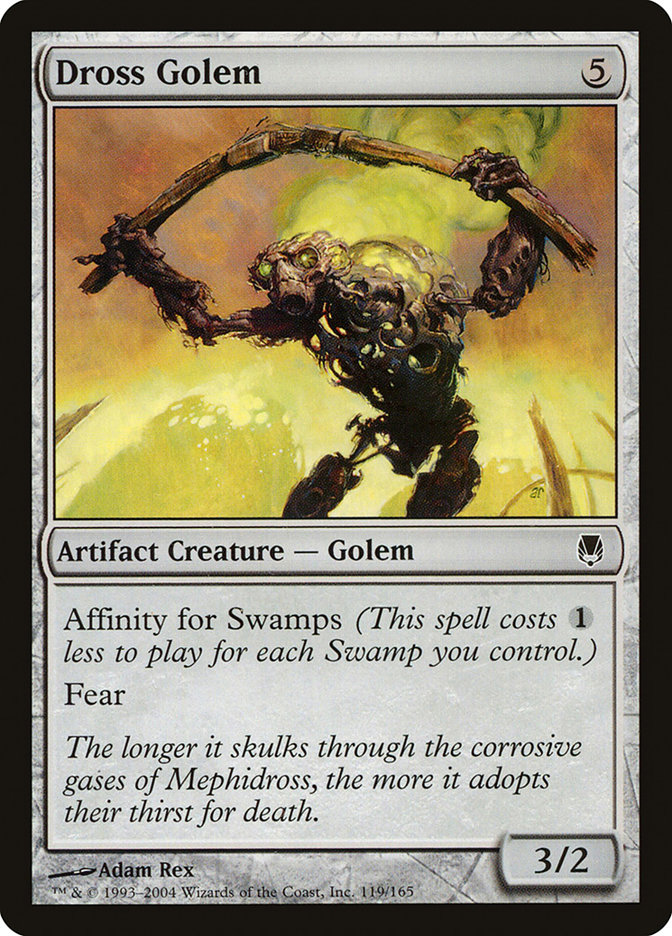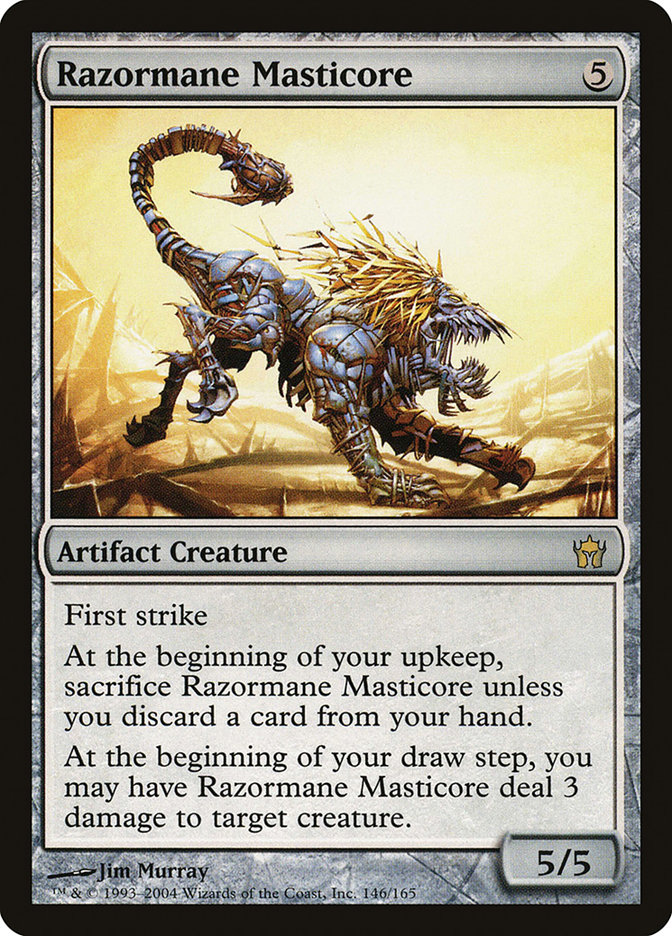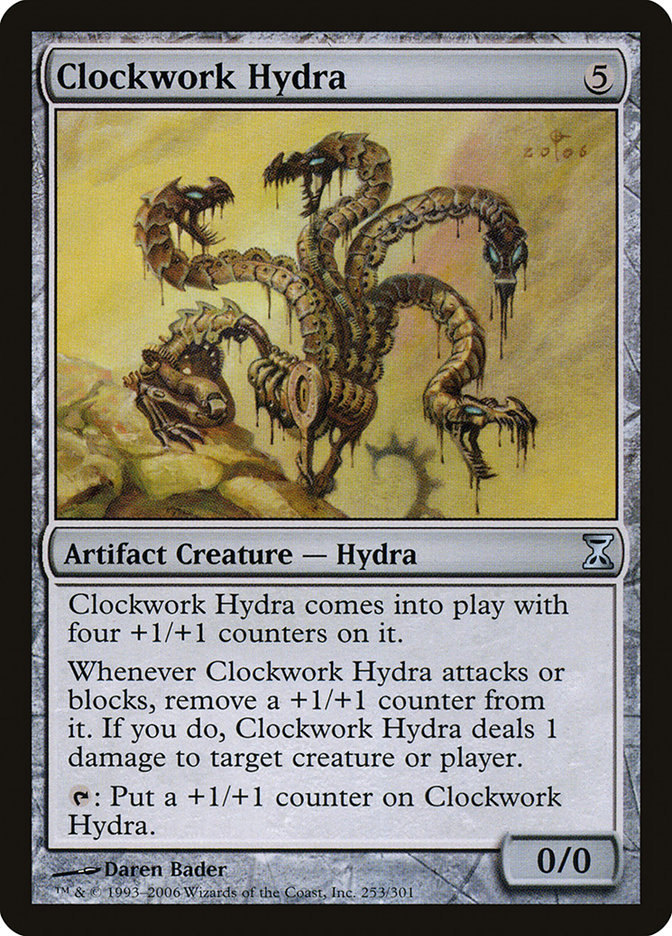Lich's Mirror MTG Card
| Card sets | Released in 3 setsSee all |
| Mana cost | |
| Converted mana cost | 5 |
| Rarity | Mythic |
| Type | Artifact |
Text of card
If you would lose the game, instead shuffle your hand, your graveyard, and all permanents you own into your library, then draw seven cards and your life total becomes 20.
It shows not what you are but what you were.
Cards like Lich's Mirror
Lich’s Mirror from Magic: The Gathering offers a unique effect that represents a lifeline in dire situations. When comparing it to similar cards, Platinum Angel emerges as a counterpart, granting its controller immunity from losing the game. However, unlike Lich’s Mirror, Platinum Angel doesn’t reset the game state but simply allows you to ignore the traditional conditions for losing.
Another comparable card is Worship, which—while contingent on controlling a creature—prevents your life total from dropping below 1. This effect shares the survive-at-all-costs spirit with Lich’s Mirror, but doesn’t offer the same full reset feature. Then there’s Phyrexian Unlife, a card that adds an extension to your life total by letting you take damage in the form of poison counters after your life hits zero. This approach differs from Lich’s Mirror’s complete status refresh but still offers a form of last-stand protection.
Ultimately, Lich’s Mirror stands out in its unique approach to resetting one’s game state, rather than simply delaying defeat. It provides a second chance for players who are staring down certain loss, making it a distinct option among the card’s lifeline providing peers in Magic: The Gathering.
Cards similar to Lich's Mirror by color, type and mana cost
Card Pros
Card Advantage: Lich’s Mirror has the potential to significantly alter the momentum in your favor. Upon triggering, the card replaces itself along with a fresh set of seven cards, effectively replenishing your hand and providing you with ample options to overcome precarious situations.
Resource Acceleration: By resetting your life total to 20 and giving you a full grip of cards, Lich’s Mirror can indirectly accelerate your resources. This fresh slate can be the equivalent of a second chance at capitalizing on your mana base and deployed resources, allowing you to play a longer and more sustained game.
Instant Speed: While Lich’s Mirror itself isn’t played at instant speed, its triggered ability can function during any phase of the turn, including your opponent’s. This means that, essentially, you gain an instant-speed reset. In cases where you’d lose the game, being able to immediately rebuild your board state can catch an opponent off guard and turn the tides in your favor.
Card Cons
Discard Requirement: Lich’s Mirror doesn’t directly ask for a discard, but the reset it triggers upon your life hitting 0 can lead to a significant setback. You’ll lose your hand, alongside all permanents, meaning it’s almost as if you’re discarding your entire game progress and starting fresh.
Specific Mana Cost: Lich’s Mirror has a rigid mana requirement with five including one specifically colorless, which can be tricky to meet in multicolor decks or ones that operate on a tighter mana curve. This can often delay the deployment of the card or even prevent it from being played at all in certain situations.
Comparatively High Mana Cost: With a cost of five mana, Lich’s Mirror is an investment, and it could be argued that the card doesn’t immediately affect the board state upon being played. In contrast, other five mana spells or permanents could offer immediate and potentially game-changing impacts.
Reasons to Include in Your Collection
Versatility: Lich’s Mirror offers a unique safety net, capable of fitting into decks that push the limits with life-total strategies. Its ability to reset your game state can be a pivotal turn in matches where you’re on the brink.
Combo Potential: With Lich’s Mirror, inventive players can explore synergies that deliberately manipulate life totals for gain. It is particularly synergistic in decks that can sacrifice life for massive advantage, knowing they have a reset button at hand.
Meta-Relevance: Lich’s Mirror can be a game-changer in a meta with aggressive strategies that aim to deplete life totals quickly. In such an environment, having this artifact can prolong your survival and give you a second chance at victory.
How to beat
Lich’s Mirror is an artifact card with a unique place in MTG, known for its ability to offer a second chance at victory when a player’s life total dips to zero. It presents a fresh slate, shuffling their hand, graveyard, and all permanents they own into their library while setting their life back to twenty. Though it appears formidable, overcoming Lich’s Mirror can be achieved with strategic play.
One effective method is utilizing cards that force opponents to discard or exile Lich’s Mirror before its effect can trigger. Alternatively, applying pressure with repeated damage sources can stress the resources of players relying on it. Since Lich’s Mirror doesn’t prevent loss from drawing from an empty library, milling strategies also serve as potential countermeasures, aiming to deplete the opponent’s library quickly. Additionally, employing spells that specifically target and destroy artifacts can dismantle the protection Lich’s Mirror offers, leaving your opponent vulnerable once more.
Overall, countering Lich’s Mirror in MTG involves a combination of preemptive strikes, maintaining continuous pressure, and utilizing the right disruption tactics to prevent or mitigate its game-resetting ability, ensuring your path to victory remains unobstructed.
Where to buy
If you're looking to purchase Lich's Mirror MTG card by a specific set like Shards of Alara and Mystery Booster Retail Edition Foils, there are several reliable options to consider. One of the primary sources is your local game store, where you can often find booster packs, individual cards, and preconstructed decks from current and some past sets. They often offer the added benefit of a community where you can trade with other players.
For a broader inventory, particularly of older sets, online marketplaces like TCGPlayer, Card Kingdom and Card Market offer extensive selections and allow you to search for cards from specific sets. Larger e-commerce platforms like eBay and Amazon also have listings from various sellers, which can be a good place to look for sealed product and rare finds.
Additionally, Magic’s official site often has a store locator and retailer lists for finding Wizards of the Coast licensed products. Remember to check for authenticity and the condition of the cards when purchasing, especially from individual sellers on larger marketplaces.
Below is a list of some store websites where you can buy the Lich's Mirror and other MTG cards:
 BUY NOW
BUY NOW BurnMana is an official partner of TCGPlayer
- eBay
- Card Kingdom
- Card Market
- Star City Games
- CoolStuffInc
- MTG Mint Card
- Hareruya
- Troll and Toad
- ABU Games
- Card Hoarder Magic Online
- MTGO Traders Magic Online
See MTG Products
Printings
The Lich's Mirror Magic the Gathering card was released in 3 different sets between 2008-10-03 and 2020-03-08. Illustrated by Ash Wood.
| # | Released | Name | Code | Symbol | Number | Frame | Layout | Border | Artist |
|---|---|---|---|---|---|---|---|---|---|
| 1 | 2008-10-03 | Shards of Alara | ALA | 210 | 2003 | Normal | Black | Ash Wood | |
| 2 | 2020-03-08 | Mystery Booster Retail Edition Foils | FMB1 | 106 | 2003 | Normal | Black | Ash Wood | |
| 3 | The List | PLST | ALA-210 | 2003 | Normal | Black | Ash Wood |
Legalities
Magic the Gathering formats where Lich's Mirror has restrictions
| Format | Legality |
|---|---|
| Commander | Legal |
| Legacy | Legal |
| Modern | Legal |
| Oathbreaker | Legal |
| Vintage | Legal |
| Duel | Legal |
| Predh | Legal |
| Penny | Legal |
Rules and information
The reference guide for Magic: The Gathering Lich's Mirror card rulings provides official rulings, any errata issued, as well as a record of all the functional modifications that have occurred.
| Date | Text |
|---|---|
| 2008-10-01 | Although Lich’s Mirror has you draw a hand of seven cards and sets your life total to 20, this isn’t a game restart. You can’t take a mulligan if you don’t like your new hand of cards. |
| 2008-10-01 | Any abilities that trigger when the permanents leave the battlefield will be put on the stack after Lich’s Mirror’s entire effect has been applied. |
| 2008-10-01 | As part of Lich's Mirror's effect, it typically shuffles itself into your library. If it does, that means that if you'd lose the game *again* immediately after its effect is finished, it can't help you a second time. This can occur in a few different ways. For example: -- You have ten or more poison counters. Lich's Mirror doesn't remove poison counters. If you'd lose the game this way, you'll do what Lich's Mirror says, then you'll lose the game the next time state-based actions are checked. -- Your life total is 0 or less and an effect says that you can't gain life. Since your life total can't be raised, it stays at whatever it is rather than becoming 20, and you'll lose the game the next time state-based actions are checked. -- The number of nontoken permanents you own plus the number of cards in your hand, graveyard, and library is less than seven. When you try to draw seven cards as part of Lich's Mirror's effect, you'll be unable to complete at least one of those draws and you'll lose the game the next time state-based actions are checked. -- You control *but don't own* a permanent such as Immortal Coil with a triggered ability that causes you to lose the game when a certain game state happens (also known as a “state trigger”), and the condition that causes the “lose the game” ability to trigger hasn't changed. If you owned the permanent, Lich's Mirror would shuffle it into your library. In this case, however, it remains on the battlefield and its ability will trigger again. |
| 2008-10-01 | For your life total to become 20, you actually gain or lose the necessary amount of life. Keep in mind that you may have a negative life total when this happens. For example, if your life total is -4 when you would lose the game, Lich’s Mirror’s effect will cause you to gain 24 life. Other cards that interact with life gain or life loss will interact with this effect accordingly. |
| 2008-10-01 | If a spell causes you to lose the game the next time state-based actions are checked (by dealing damage to you greater than your life total, for example), that spell will already be in the graveyard by the time Lich’s Mirror’s effect happens. If it’s in your graveyard, it will be shuffled into your library. |
| 2008-10-01 | If all the players remaining in a game would lose simultaneously but one of them controls Lich’s Mirror, that player does what Lich’s Mirror says instead of losing, and everyone else loses. As a result, the controller of Lich’s Mirror wins the game because all of their opponents have lost. (If Lich’s Mirror weren’t in the picture, then the game would be a draw.) |
| 2008-10-01 | If you can’t lose the game (for example, you control a Platinum Angel), Lich’s Mirror won’t do anything. |
| 2008-10-01 | If you control *but don’t own* Lich’s Mirror, Lich’s Mirror itself will still be on the battlefield after its effect is finished. If you would lose the game again for any of the reasons above, Lich’s Mirror has its effect again . . . and again . . . and again. An involuntary infinite loop will be created, and the game will end in a draw. (In the case of the triggered ability example given last in the list above, it’s possible that a player could cause the loop to end while the ability is on the stack. None of the loops caused by state-based actions can be stopped at all.) |
| 2008-10-01 | If, during a check of state-based actions, you’d lose the game at the same time a creature you own would be put into your graveyard (due to an Earthquake for 10 or combat damage dealt to both you and the creature, for example), that creature’s controller has a choice to make. The state-based actions rule is trying to simultaneously (a) shuffle that creature card into your library (due to Lich’s Mirror’s replacement effect) and (b) put it into your graveyard. Only one of those things can happen. The creature’s controller chooses which one. If the creature is put into your graveyard, it isn’t shuffled into your library. Abilities that trigger when that creature is put into a graveyard will trigger only if that option is chosen. |
| 2008-10-01 | If, during a check of state-based actions, you’d lose the game for multiple reasons (for example, if you were at 1 life and had one card in your library, then Night’s Whisper caused you to draw two cards and lose 2 life), a single Lich’s Mirror will replace all of them. You’ll do what Lich’s Mirror says just once. |
| 2008-10-01 | Lich's Mirror replaces the game-loss event if you would lose the game in the following ways: -- As a state-based action for having 0 or less life. -- As a state-based action for having tried to draw a card from an empty library since the last time state-based actions were checked. -- As a state-based action for having ten or more poison counters (though this isn’t that helpful; see below). -- Because an ability (such as the one from Immortal Coil) states that you do so. |
| 2008-10-01 | Lich’s Mirror doesn’t affect spells on the stack, cards that have been exiled, or permanents you control but don’t own. They’ll stay where they are. Spells on the stack will then resolve as normal. |
| 2008-10-01 | Lich’s Mirror has no effect if a spell or ability (such as the one from Helix Pinnacle) states that a player “wins the game.” If a player wins the game, the game ends immediately. |
| 2008-10-01 | Lich’s Mirror has no effect if you concede the game. If you concede, you’ll lose. |
| 2008-10-01 | Lich’s Mirror shuffles permanents you own into your library, regardless of who controls them. |
| 2008-10-01 | Lich’s Mirror shuffles tokens you own into your library, too. The tokens you own will leave play. However, there’s no point to physically shuffling tokens into your library because you can’t draw them as part of Lich’s Mirror’s effect and they’ll cease to exist immediately afterwards. |
| 2009-10-01 | A token’s owner is the player under whose control it entered the battlefield. |
| 2010-06-15 | In a Two-Headed Giant game, if your team would lose the game and you control Lich’s Mirror, your team won’t lose. Instead, you’ll do what Lich’s Mirror says and your teammate won’t do anything. This is true even if the reason your team would lose is because your teammate tried to draw a card with an empty library or was affected by an ability that said they lost the game. Your life total (which is the same as your team’s life total) becomes 20. Your team’s life total is adjusted by the amount of life you gain or lose as a result of this, which basically means your team’s life total becomes 20. |
